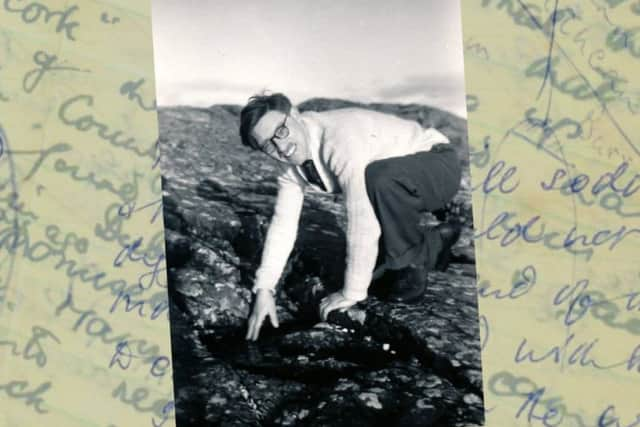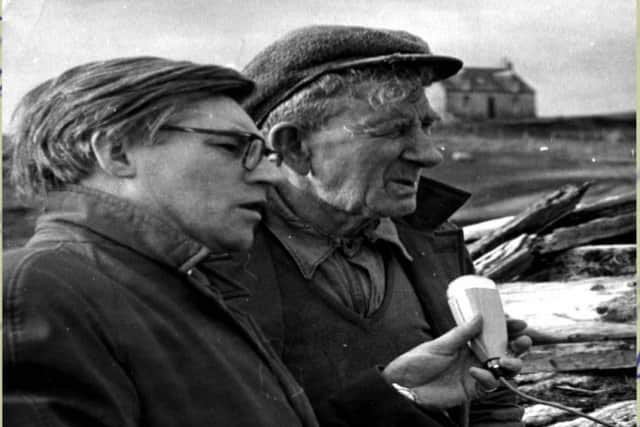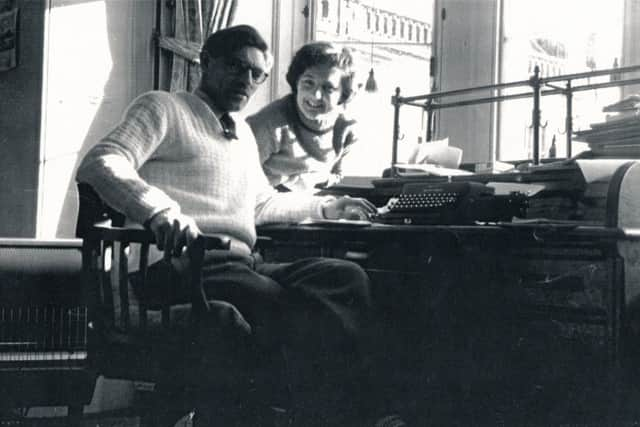Celebrating a forgotten island folklorist and ‘man of the people’
Fresh interest is surrounding the work of folklorist Eric Cregeen who spent decades documenting the way of the people of Tiree.
His boxes of notebooks, which were meticulously kept and documented hundreds of audio recordings from the island and beyond, were packed away in the family home for more than 20 years following his sudden death in 1983.


Advertisement
Hide AdAdvertisement
Hide AdLast year, the notebooks were published as The Eric R Cregeen Fieldwork Journals after they were handed by his wife Lily to Dr Margaret Bennett, the writer and ethnologist at the helm of Grace Note Publications.
Now, a new BBC Alba documentary further celebrates the life and work of Cregeen, who was admired by both scholar and crofter for his professionalism, his passion and his natural ease as a ‘man of the people’.
Padruig Morrison, presenter of Eric R Cregeen and The Carrying Stream, said: “For me, he was a genuinely committed and genuinely passionate collector and was himself connected to the island and the people of the isle.”


Mr Cregeen spent his childhood on the Isle of Man and later did much to record and promote the Manx language as associate director of the Manx Museum.
Ultimately he felt ‘kinship’ with the West Coast island people and went on to learn Scots Gaelic, Mr Morrison said.
“He got it and he got the people in a really deep way,” said Mr Morrison, a graduate in music and ethnology at Edinburgh University.
In 1966, Cregeen joined the staff of the School of Scottish Studies at Edinburgh University and became one of its most productive fieldworkers and researchers.


Often he would take his wife and children on holiday to Tiree, where he would spend time going from croft to croft to see if anyone was in.
Advertisement
Hide AdAdvertisement
Hide AdOne crofter, Donald Sinclair, who came from a long line of bards, became a good friend of Cregeen’s with the pair sitting together for hours as song and chat filled the room.
Professor Donald E Meek, a professorial fellow in Celtic and Gaelic at Glasgow University, was an old friend and contemporary of Cregeen.
He told BBC Alba: “It was as natural for Eric Cregeen to be amongst people as it was for him to draw breath.
“There was nothing that he wouldn’t do along with the people.
“Eric Cregeen was a man of the people. He liked nothing better than sitting alongside people like Donald Sinclair, for example. They would sit there for hours.”
Professor Meek added “Eric was like a friend who had an amazing mind. The essays he wrote are like exceptional pieces of writing.”
The documentary features a recording of a song sung by Donald Sinclair, the last person familiar with the tune and its last known words.
The programme also presents a 1973 recording of a tune played by piper Donald Ewen MacDonald, from Balranald, North Uist.
Advertisement
Hide AdAdvertisement
Hide AdThe tune was played by MacDonald some 52 years earlier when he led the Balranald Land Raids, when 12 men marched on the Balrandald Estate to claim land promised to them in return for service during World War One.
The raiders were jailed, including MacDonald who spent 21 days in Inverness Jail.
It seems likely that the tune, which was written by a school master from North Uist, would have vanished by now had it not been for Cregeen’s recordings.
Presenter Padruig Morrison said: “I was listening to that recording just before working on the programme.
“There are young lads in MacDonald’s family who do the chagter at school and they have this opportunity to listen to their relative playing that tune and understanding that piece of history that is in their own family. That is really important for them and where they are from.”
Cregeen worked contemporaneously with folklorists and chroniclers such as John Lorne Campbell, Margaret Fay Shaw and John MacInnes but his work has not received the same attention, up until now.
Mr Morrison said: “Eric Cregeen died suddenly and he didn’t get a chance to complete or publish his findings.
“He worked with many different groups in the Isle of Man and through Edinburgh and Glasgow universities.
Advertisement
Hide AdAdvertisement
Hide Ad“He was always there doing the work but he wasn’t always the front man, he wasn’t necessarily the poster boy.
“Now that his journals have been printed, that that should really become the real go to resource for the next generation of researchers.
“Eric Cregeen did an enormous amount of work. There was a kind of timer there to try and capture as much as he could before it simply died out.
“I am so glad we were able to do the programme. We have rekindled the flame of the man.”
Eric R Cregeen and The Carrying Stream is available to watch on BBC Alba on BBC iPlayer.